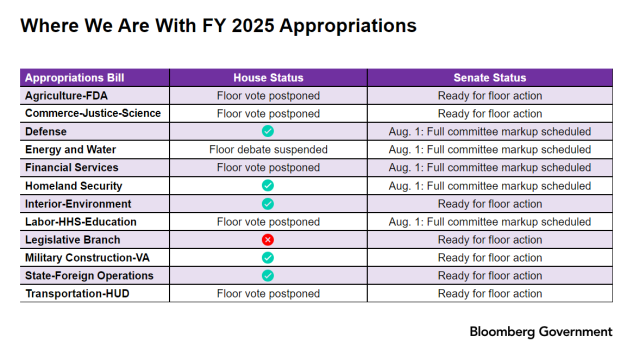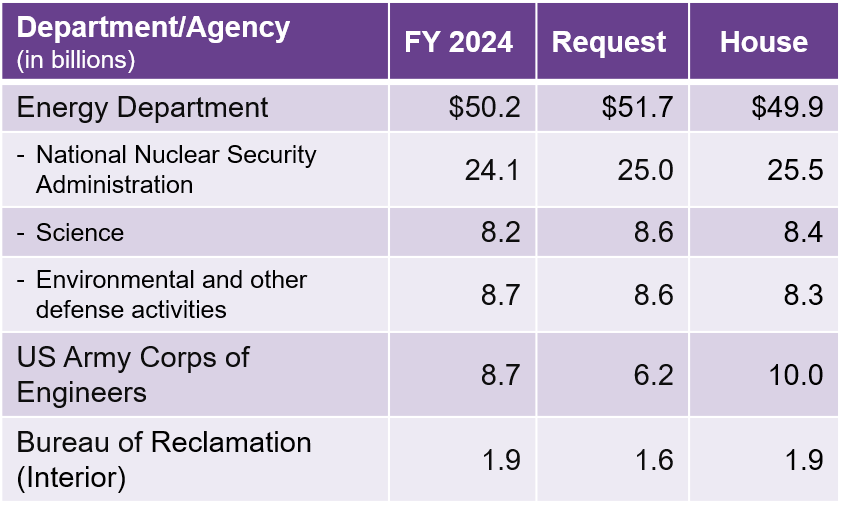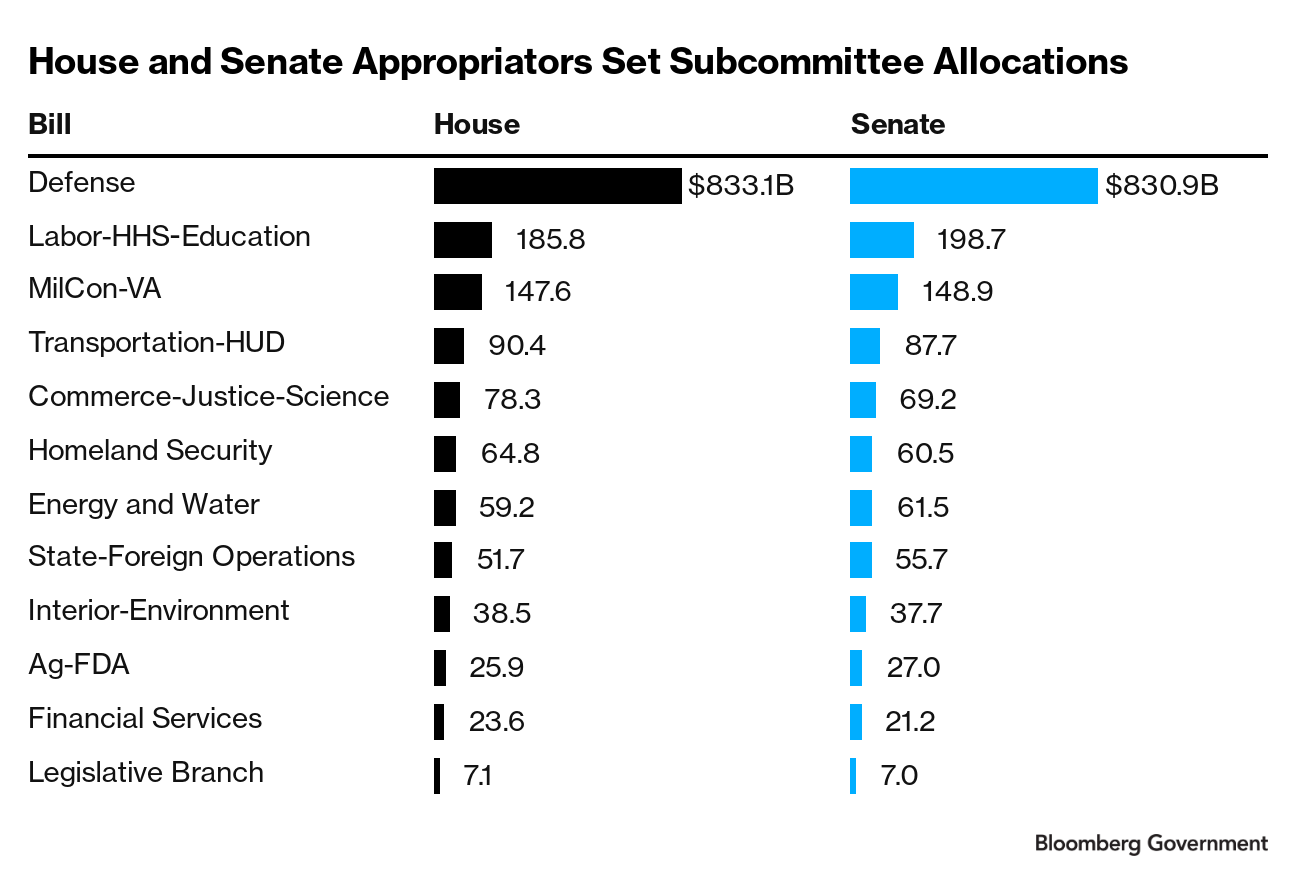HOUSE ENERGY & WATER BILL DELAYED WHILE SENATE COUNTERPART MOVES TO MARKRUP
Last week House lawmakers pulled (H.R. 8997), the House Energy and Water Appropriations Act for FInancial Year (FY) 2025, from the House floor in a move that delays a
would-be vote on the bill. The bill is now suspended and there are currently no clear plans to reschedule the vote. 
The suspended House version of the bill would decrease funding from FY2024 for Environmental and Other Defense Activities from $8.7 million to $8.3 million, a $339 million decrease, while increasing funding for the NNSA by almost $1.4 billion. The Bill contains no provisions to provide funding for Defense Uranium Enrichment Decontamination and Decommissioning (UED&D). See below for more detailed appropriations
numbers: - Defense Environmental and other Defense Activities: $8,311,000,000 (-$339,000,000 from FY2024)
- Defense Environmental Cleanup: $7,132,000,000 (-$153,000,000 from FY2024)
- Defense UED&D: $0 (-$384,957,000 from FY2024)
- Other Defense: $1,179,000,000 (+ $99,000,000 from FY2024)
- National Nuclear Security Administration: $25,467,000,000 (+
$1,332,000,000 from FY2024)
- Weapons Activities: $20,338,752,000 (+ $1,230,752,000 from FY2024)
- Defense Nonnuclear Proliferation: $2,445,000,000 (-$136,000,000 from FY2024)
- Naval Reactors: $2,118,773,000 (+$172,773,000 from FY2024)
- Federal Salaries & Expenses $564,475,000 (+$64,475 from FY2024)

For the full committee report, click here. Given the suspension of the bill, we can expect that a lawmakers will turn to a negotiations process in order to pass a Continuing Resolution (CR). In this scenario, a CR would be passed after the November elections to keep Energy and Water operations funded through the year. In other news, the Energy and Water Bill’s Senate counterpart has been scheduled for a full committee markup
this Thursday, August 1, along with a variety of other appropriations bills. The bill would headline spending at $61.5 billion. Watch the live hearing at 9:30 AM ET here. 
ECA will continue to provide updates on the appropriations process in both chambers. For information on the appropriations and budget process, see our
website, and be on the lookout for an updated Appropriations Tracker coming soon.
FUNDING FOR NEW EPA STANDARDS ON NUCLEAR WASTE IN SENATE REPORT LANGUAGE
A report on the Senate' Interior-Environment Appropriations Bill includes a measure to provide funds so that the Environmental Protection Agency (EPA) may develop a new and modern, technology-neutral, generic protection standard that would apply to future high level nuclear waste disposal facilities. The revision of health and safety standards are a prerequisite to ensure any
future repository for high-level waste and commercial spent nuclear fuel (SNF) is successfully sited. The exact language is as follows: "The Committee provides $250,000 to develop a new, generic, technology-neutral protection standard that is informed by modern, international practices and that would apply to future high-level nuclear waste disposal facilities as authorized by Public Law 97– 425,
as amended. Further, the Agency is directed to brief the Committee on its plans for this matter within 90 days of enactment of this act." Read the full report here. This follows on calls from ECA and several partner organizations to revise such standards, such as in a signed letter from June to house and senate appropriators. Click the button below to read the letter.
ECA is grateful for the Committees’ continued commitment to the health and safety of people and the environment. ECA will continue to provide updates regarding development of a new standard and future developments in repository siting.
ECA SURVEY Should DOE Prioritize “Legacy” TRU Waste or Treat all TRU Waste Equally for Disposal at WIPP Under the New Permit with the State of NM?
ECA is conducting a survey to get your input that will help ECA and other organizations identify and provide input into the prioritization of the source of the TRU waste that is being disposed at WIPP from DOE generator sites. WIPP (DOE EM), as a requirement under DOE’s state permit, is developing a new “Waste Isolation Pilot (“WIPP”) Legacy TRU Waste Disposal Plan” (the “Plan”). ECA members around WIPP have asked ECA member communities and others around the country that are interested in TRU waste and WIPP issues, for their input through this survey on the Plan. The questions will focus on “Legacy TRU waste”
which ECA generally defines as TRU waste associated with Cold War and World War II periods. Others define it differently and if you do, please note it in the survey comments at the end of the questionnaire. ECA recognizes that some sites generate both Legacy TRU waste and non-legacy TRU waste. Communities around the country have recognized the importance of WIPP to cleaning up the DOE sites in their communities. Because
this plan could affect the prioritization of TRU waste shipments and the accessibility of WIPP to these communities (DOE calls these sites “generator sites”), ECA is asking for feedback from the citizens, local, state and Tribal governments and others on the issues. ECA will post the results of the survey on our web page after the survey results are recorded. Please try to complete the survey at your earliest convenience. This Survey will close on August 15.
For more on the survey, or if you have any questions, please contact Andres Ridge at ajr@energyca.org
September 16-18, 2024| Crystal Gateway Marriott | Arlington, VA Join us for the 10th Annual National Cleanup Workshop!
Hear from senior DOE leaders, local government officials, and industry leaders about DOE's cleanup priorities, the future of the workforce, and more.
Featured Speakers: - The Honorable Jennifer M. Granholm, Secretary of U.S. Department of Energy
- Rep. Chuck Fleischmann (TN-03), Chairman, House Appropriations Energy and Water Development
Subcommittee
- Candice Robertson, Senior Advisor, DOE-EM
- Jeff Avery, Principal Deputy Assistant Secretary, DOE-EM
- Greg Sosson, Associate Principal Deputy Assistant Secretary for Field Operations, DOE-EM
- Kristen Ellis, Associate Principal Deputy Assistant Secretary for Regulatory and Policy Affairs, DOE-EM
- Dae Chung, Associate Principal Deputy
Assistant Secretary for Corporate Services, DOE-EM
- James McConnell, Associate Principal Deputy Administrator, National Nuclear Security Administration
- Brent Gerry, Mayor, City of West Richland, WA; Chair, ECA and
- Rebecca Casper, Mayor, City of Idaho Falls, Idaho, and Vice-Chair, ECA.
Hosted by ECA with the cooperation of the Energy Facility Contractors Group and DOE-EM, the workshop brings together more than 800 senior DOE executives, officials from DOE sites, industry leaders,
local elected officials, contractors and community stakeholders to discuss EM’s progress to address the environmental legacy of the Manhattan Project and Cold War-era U.S. nuclear weapons program.
GAO: Nuclear Waste Cleanup:Changes Needed to Address Current and Growing Shortages in Mission-Critical Positions What GAO Found: The Department of Energy's (DOE) Office of Environmental Management (EM) continues to be understaffed. At the end of fiscal year 2023, EM had 263 vacant positions. Moreover, EM had an overall 18 percent vacancy rate for its 14 mission-critical job series (see table). EM's workforce is also aging—44 percent of its staff will be eligible for retirement by 2030. EM workforce management challenges have caused project failures and
affected the mission through schedule delays, cost overruns, and workplace accidents, according to DOE assessments. These assessments found that additional failures are likely without efforts to address workforce challenges. Look out for a a full story summarising and detailing the findings of this report later this week. Read the full report here.
Gone Fission Nuclear Report: Consent-Based Siting for Spent Nuclear Fuel: A National Conversation July 29, 2024 | S4 E14 The Gone Fission Nuclear Report travels to the nation’s capital this week to join a national conversation on next steps for identifying a community to host interim spent fuel storage from America’s nuclear power plants. Our podcast sponsor, the Energy Communities Alliance, convened a meeting of elected officials, community leaders, economic
developers and Department of Energy officials to discuss what kind of incentives a community will need--and what kind of economic benefits can accrue--from volunteering to host an interim storage facility. This is an important topic as the U.S. finds itself on the brink of a nuclear renaissance that will increase the role of nuclear energy in meeting our national energy needs. Is your community interested in exploring safe spent fuel storage as an economic driver?
|
|